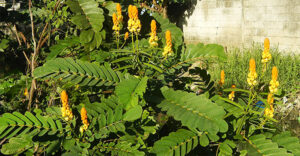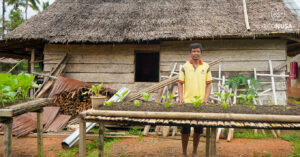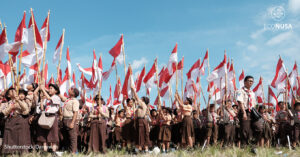
Since the idea of the Djoeanda Declaration was adopted in the 1982 United Nations Convention on the Law of the Sea (UNCLOS), Indonesia has a vast sea area, around 5.8 million km2 which is three quarters of its total area. Inside are 17,504 islands and surrounded by a coastline of 95,200 km, the second longest after Canada. This physical fact is what makes Indonesia known as the largest archipelago in the world.
With this vast sea area, it deviates from the enormous maritime economic potential. There are at least 11 marine economic sectors, namely capture fisheries, aquaculture, fishery product processing industries, and marine biotechnology industries. Then, mining and energy, marine tourism, mangrove forests, sea transportation, small island area resources, industry and maritime services, and non-conventional natural resources.
The total economic value of the eleven marine economic sectors is estimated at US $ 1.4 trillion per year, around 1.3 times GDP and 7 times the 2018 state budget, and can provide employment for 45 million people. The function and role of Indonesia’s sea areas is increasingly strategic, as the global economic center shifts from the Atlantic Axis to the Asia-Pacific. Because about 45% of the total goods traded in the world, with a value of US $ 15 trillion per year, is shipped via the Indonesian Archipelago Sea Channel.
Unfortunately, the enormous economic potential of the maritime economy has only been utilized by around 25%. The contribution of the fisheries sector, for example, is only 2.7% of GDP, and its export value was only around US $ 4 billion in 2017. In comparison, Thailand with a sea area of less than 10% of Indonesia’s sea area, is able to gain a foreign exchange of fisheries of around US $ 10 billion in 2017. That is, the space to develop a maritime economy for the progress and prosperity of the nation is still wide open.
On the other hand, the rights of coastal communities (fishermen, women fishermen, fish farmers, salt farmers, preservers of coastal ecosystems, coastal traditional communities) are still largely ignored. The Kiara Data and Information Center (2017) notes that the number of coastal villages in Indonesia is 12,827 villages out of 78,609 villages spread throughout Indonesia. at least, there are 8,077,719 fishery households that live and inhabit coastal village areas and depend their lives on fishing activities. If one household consists of 3 people, then there are more than 25 million people who live in coastal areas and depend their lives on fishing activities. However, if one household consists of 5 people, then there are more than 40 million people who live in coastal areas and depend their lives in the fisheries sector.
In general, there are a number of serious problems faced by coastal communities from the causes of problems that originate from nature, natural damage caused by human activity both directly and indirectly, and socio-political and political problems. In the context of relations with the state, coastal communities are threatened to have to deal with government projects in the form of reclamation, coastal mining, and tourism which result in coastal communities displaced from their livelihoods without any definite protection of their attachment to coastal and marine areas.
To ensure that the constitutional rights of coastal communities are fulfilled, the political will of the government and political elite is crucial in formulating policies and action plans. The 2019 election became a momentum for national leaders to compete to strengthen commitment and alignment for sustainable marine development. This should at least be reflected in the vision and mission and work program of pair number 01 Joko Widodo-KH Ma’ruf Amin and number pair pair number 02 Prabowo Subianto-Sandiaga Uno. Let’s get surgery one by one.
Vice President Sandiaga Uno explained, one of the pair 02 maritime economic action programs was to build centers of marine economic growth based on small islands and coastal cities. In fact, Indonesia’s small islands are very vulnerable to the effects of climate change, in addition to damage to the marine ecosystem. Meanwhile, to create maritime economic growth based on small islands and coastal cities, it starts with recording and including it in the national maritime map, which is not currently available.
“This maritime map is very important for the enforcement of sovereignty and maritime law, as well as planning an island development program that is more targeted,” Sandiaga told KONTAN, recently.
In the context of the 2019 Presidential Election, important marine issues were raised as one of the campaign materials. The consideration is that one out of three Indonesians depend on them to work as farmers and fishermen. In fact, our country is an agricultural country as well as a maritime country. It is imperative for future governments to pay attention to the fate of fishermen and farmers, including through the growth of national maritime agro-capacity. “Efforts to strengthen the agriculture and fisheries sector are our focus going forward, because it has a double impact besides opening up employment opportunities and alleviating poverty,” he said.
According to Sandiaga, the rights of small fishermen to search for fish in a sustainable manner must be guaranteed. “I met and got complaints from Mr. Nur Suud, one of the fishermen at the Puger Fish Auction Place (TPI), when entering the east wind season there was difficulty in going to sea, the result of a small catch. They call the flying saucer season. The season when household furniture is sold to continue living, “he said.
In this context, Prabowo-Sandiaga will try to fight for the fate of fishermen to be guaranteed economically. The way to do this is by developing a farmer and fishermen bank, in addition to savings and loans, it also helps the livelihood of fishermen during famine, for example getting loans to open businesses.
Not only that, he tried to stop all forms of illegal activities at sea, including illegal fishing and destructive behavior of the marine ecosystem which is very detrimental to fishermen and coastal communities and small islands. Because the theft of large-scale fish by foreign vessels will drain the catch of fishermen. “Also an approach to education and ongoing outreach to fishermen and coastal communities, applying incentives to compliance and disincentives including law enforcement,” said Sandiaga.
Then, other environment and marine related work programs are in addition to building maritime economic growth centers. The former deputy governor of DKI Jakarta sees the importance of efforts to build connectivity between the economic growth centers of small islands and coastal cities. Then, encourage the productivity of marine economic results for the welfare of coastal communities and fishermen. No less important is building a fishing fleet to serve the sea in the Exclusive Economic Zone.
On the other hand, the Prabowo-Sandiaga pair, if they get the security to lead the next five years, will encourage the progress of the national marine industry. The progress of the marine industry has become a target of industrialization based on local resources. Indonesia is one of the countries with the longest coastline in the world, abundant potential, so extensive and smart efforts are needed to realize this maritime potential. “Pak Prabowo and I will grow infrastructure that reaches maritime centers, including marine infrastructure, especially fish auction places and public fish markets,” he promised.
Furthermore, it will open up the processing industry by involving businesses and foreign investors to develop export-oriented marine products. Last is to increase protein consumption, for children and young people, while at the same time fostering a maritime culinary creative industry.
As incumbent candidates in the upcoming 2019 Presidential Election, Jokowi-Ma’ruf will certainly continue Indonesia’s aspiration to become the World Maritime Axis. To that end, the Jokowi-Ma’ruf National Campaign Team has designed the vision and mission mission of Nawacita II, which focuses on realizing Indonesia’s ideals as the World Maritime Axis in building the nation.
Rokhmin Dahuri, Spokesperson for Maritime Affairs and Fisheries TKN Jokowi-Ma’ruf said, basically there are five main policy groups and development programs that must be undertaken: First, upholding sovereignty, including completing maritime boundaries with neighboring countries, protecting sea areas from any undermining of sovereignty, eradicating illegal fishing and various other illegal activities; Second, the development of the marine economy to improve competitiveness, quality economic growth, and people’s welfare in a sustainable manner; Third, maintaining the preservation of natural resources and the marine environment; Fourth, development of human resource capacity, science and technology, and marine innovation; and fifth, increasing the nation’s maritime culture.
Indeed, one of the bright ideas of President Jokowi and Vice President Jusuf Kalla who received public support with enthusiasm was to realize Indonesia as the World Maritime Axis, namely a developed, prosperous, and sovereign Indonesia based on the marine economy, security and maritime culture. “More than that, Indonesia is expected to become a reference or role model for other nations in the world in various fields of marine affairs, ranging from the economy, science and technology, defense and security to how to organize marine development,” said Professor of the Faculty of Fisheries and Maritime Affairs, Bogor Agricultural University (IPB) to KONTAN, earlier this month.
In addition to increasing the development budget and allocating bank credit, the Jokowi-JK government also established the Maritime Coordinating Ministry to accelerate and synergize development in the maritime sector. However, Rokhmin notes that the pattern of development that is too dominant in law enforcement and conservation that is ‘blindly’ needs to be discussed again because the challenge in the future is that it must lead to a pattern of sustainable marine development (sustainable maritime development). This is a pattern of marine development that is able to increase the nation’s competitiveness, inclusive economic growth, people’s welfare, and the sovereignty of the Republic of Indonesia in a sustainable manner, without compromising the sustainability of marine resources and ecosystems.
“Policies to improve fishermen’s welfare which include licensing fishing business facilities, the formation of fishing cooperatives for cheap production facilities as well as for processing to marketing fishermen products will be the focus of our attention,” said Rokhmin who also serves as Chairperson of the Department of Maritime Affairs PDIP DPP.
On the other hand, the revitalization of aquaculture business in order to increase productivity, efficiency, competitiveness, and sustainability, together with the formation of integrated supply chain management will be pursued as optimal as possible. In addition, the importance of extending the aquaculture business in new waters and developing aquaculture businesses with new species that are economically accepted by the world market.
“In order for our marine products to be competitive and competitive in the world market, modern fishery product processing industries such as tempura, surimi based products, canning must continue to be developed,” he said. Not only that, in the industrial era 4.0, millennial generation must be increased as a maritime economic agent for example as a marine tourism guide such as snorkeling, diving, sailing, and surfing.
By implementing this Marine Development Roadmap in a sustainable manner, Rokhmin is optimistic that starting in 2020, Indonesia will not only be able to overcome a number of current national problems, such as poverty, social inequality, inter-regional development disparities, current account deficits, and low competitiveness, but will also be able to realize Indonesia as the World Maritime Axis, which is advanced, just and prosperous, and sovereign in 2030 or 2045.
Maritime Specialist Sarwono Kusumaatmadja assessed that the government and political elite must have a strong concern and commitment to sustainable marine development. “I think the direction of the policy carried out by the government is correct but it is still very slow. So all that’s left is to increase speed, strengthen commitment and performance effectiveness, “said the former Minister of Maritime Affairs and Fisheries at the National Unity Cabinet to KONTAN.
Sarwono reminded that the competing parties in the 2019 Presidential Election do not expect to bring up maritime development discourse, the fate of fishermen and other environmental issues will immediately boost their voices. “Be careful, that’s a different matter. But if it’s just education to popularize the maritime sector, it’s good too. The breath in this ocean is awareness, willingness and strong commitment to build a progress, “he said.
Gde Sumarjaya Linggih, Parliamentary Legislative Candidate for the Bali electoral district in 2019 Pileg said, various ways in political work carried out by political parties during the 2019 Election campaign period to win the sympathy of the community, including fishermen. This political work is carried out through empowerment, educational processes, care for the environment, economy, and health of fishermen families. “The fate of these fishermen, especially the small ones, must be considered because the conditions are still concerning,” said a Golkar Party politician from Tajun Village, Kubutambah District, Buleleng Regency, Bali.
According to this DPR Commission VI Member, large fishing groups have begun to be restricted by various regulations made by the government. Thus, the hope is that these small fishermen can develop through empowerment and so on. “Fighting for the fate of these little fishermen is a chore for us,” said the Acting Chair of the Golkar Party DPD in the Province of Bali.
Melda Wita, Managing Director of the Econusa Foundation, assessed that the sea is the future of the nation. “For us, it doesn’t matter who the president will be to elect. The most important thing is that this President can continue to pay special attention to our oceans, “he said.
This is not without basis. Because there are approximately 120 million workers who depend their lives from the sea. This should be enough to convince the elected president later how fundamentally our marine sector which has economic potential reaches US $ 1.2 trillion. “However, this potential should not only be used as a political sale that is forgotten when the elected president will take office,” Melda stressed.
Author: Dadan M. Ramdan, one of the recipients of the Fellow Sea Journalist initiated by the EcoNusa Foundation
Source: https://bit.ly/2Fad2ba







